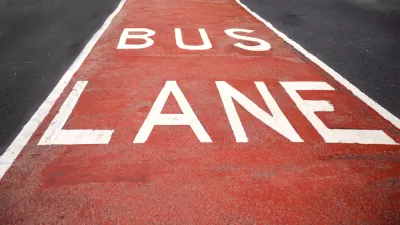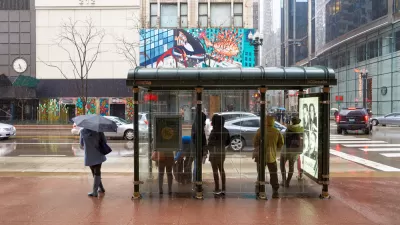Signal priority is a way to create faster, more regular bus service by adjusting length of stoplights for buses.

The signal priority system reportedly used in Los Angeles County should be a model for cities that want to speed up their public transit around the country, argues Kyle Ryan writes in Active Transportation Alliance. "Seventeen years ago, when Los Angeles County decided to give its buses priority at traffic signals, the buses experienced huge gains in speed and reliability," Ryan writes. The system senses buses coming to a stoplight and can adjust the length of red and green lights.
Cities like Chicago could use this type of system, not only to speed up public transit commutes, but also to space out buses more evenly. "Buses are dispatched every 3-10 minutes and can be instructed to slow down or speed up to avoid bunching with other buses," Ryan argues. This system means less waiting time at bus stops and shorter commute time, making transit more equitable for those not moving in cars.
FULL STORY: Los Angeles ‘signals’ the way to better bus service

Maui's Vacation Rental Debate Turns Ugly
Verbal attacks, misinformation campaigns and fistfights plague a high-stakes debate to convert thousands of vacation rentals into long-term housing.

Planetizen Federal Action Tracker
A weekly monitor of how Trump’s orders and actions are impacting planners and planning in America.

In Urban Planning, AI Prompting Could be the New Design Thinking
Creativity has long been key to great urban design. What if we see AI as our new creative partner?

King County Supportive Housing Program Offers Hope for Unhoused Residents
The county is taking a ‘Housing First’ approach that prioritizes getting people into housing, then offering wraparound supportive services.

Researchers Use AI to Get Clearer Picture of US Housing
Analysts are using artificial intelligence to supercharge their research by allowing them to comb through data faster. Though these AI tools can be error prone, they save time and housing researchers are optimistic about the future.

Making Shared Micromobility More Inclusive
Cities and shared mobility system operators can do more to include people with disabilities in planning and operations, per a new report.
Urban Design for Planners 1: Software Tools
This six-course series explores essential urban design concepts using open source software and equips planners with the tools they need to participate fully in the urban design process.
Planning for Universal Design
Learn the tools for implementing Universal Design in planning regulations.
planning NEXT
Appalachian Highlands Housing Partners
Mpact (founded as Rail~Volution)
City of Camden Redevelopment Agency
City of Astoria
City of Portland
City of Laramie





























